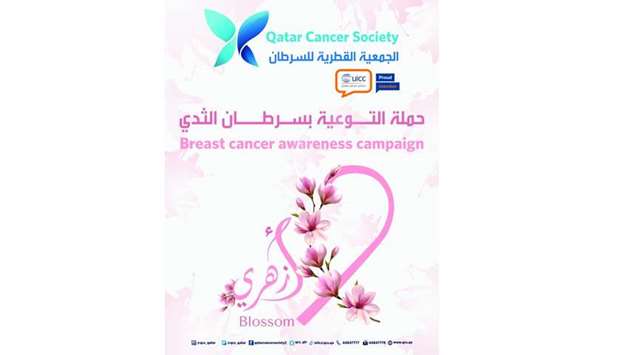Qatar Cancer Society (QCS), represented by its chairman Sheikh Dr Khalid bin Jabor al-Thani and under the patronage of US charge d’affaires William Grant, has participated in an initiative to illuminate the US embassy building in pink as part of the Breast Cancer Awareness Month that is observed in October every year.
Present on the occasion were Dr Salih al-Marri, Assistant Minister of Health Affairs at the Ministry of Public Health (MoPH), and Sheikh Dr Mohamed bin Hamad al-Thani, director of Public Health at the MoPH.
Sheikh Dr Khalid said Qatar Cancer Society's participation in this event was a continuation of its efforts towards raising awareness of the disease and ways to prevent it. He stressed the organisation's keenness to organise and participate in all events that helped achieve its vision to be the community partnership platform for making Qatar a leader in cancer prevention and its burden control, as well as its mission to realise its goals by working with its partners to educate the community and support, empower and advocate for individuals living with cancer, and to engage in professional development and scientific research in the field of cancer.
He also highlighted the importance of concerted efforts to create a healthy society and reduce the burden of disease locally and globally.
Sheikh Dr Khalid said QCS has launched the 'Blossom' campaign, which is a national initiative targeting all categories of Qatari society across all regions of the country, will be conducted throughout the month of October.
Dr Hadi Mohamad Abu Rasheed, head of the Professional Development and Scientific Research Department at QCS, said: "In 2016, according to the Qatar National Cancer Registry–Ministry of Public Health, there were 266 individuals in the country diagnosed with breast cancer, around 96% of whom were females. Also, 25.94% were Qataris, while 74.06% were non-Qataris."
Dr Abu Rasheed explained that one out of 12 women would develop breast cancer before the age of 75 years and almost 64% of breast cancer cases diagnosed in 2016 were in the early stages (1 and 2).
Sheikh Dr Khalid said Qatar Cancer Society's participation in this event was a continuation of its efforts towards raising awareness of the disease and ways to prevent it. He stressed the organisation's keenness to organise and participate in all events that helped achieve its vision to be the community partnership platform for making Qatar a leader in cancer prevention and its burden control, as well as its mission to realise its goals by working with its partners to educate the community and support, empower and advocate for individuals living with cancer, and to engage in professional development and scientific research in the field of cancer.
He also highlighted the importance of concerted efforts to create a healthy society and reduce the burden of disease locally and globally.
Sheikh Dr Khalid said QCS has launched the 'Blossom' campaign, which is a national initiative targeting all categories of Qatari society across all regions of the country, will be conducted throughout the month of October.
Dr Hadi Mohamad Abu Rasheed, head of the Professional Development and Scientific Research Department at QCS, said: "In 2016, according to the Qatar National Cancer Registry–Ministry of Public Health, there were 266 individuals in the country diagnosed with breast cancer, around 96% of whom were females. Also, 25.94% were Qataris, while 74.06% were non-Qataris."
Dr Abu Rasheed explained that one out of 12 women would develop breast cancer before the age of 75 years and almost 64% of breast cancer cases diagnosed in 2016 were in the early stages (1 and 2).

